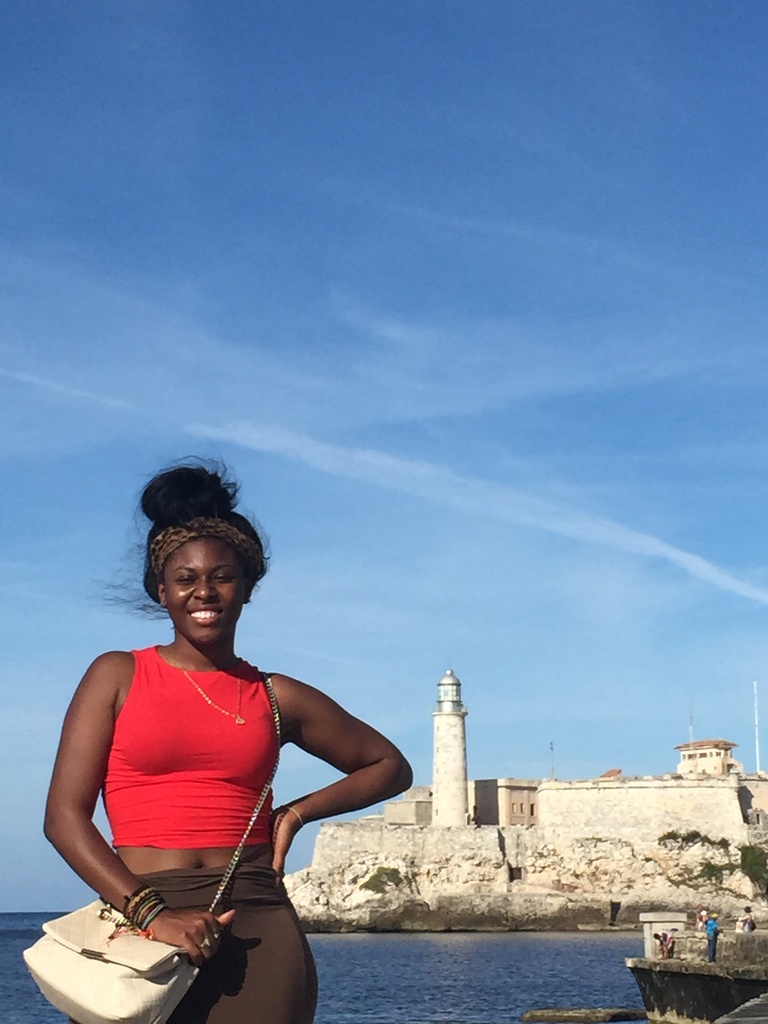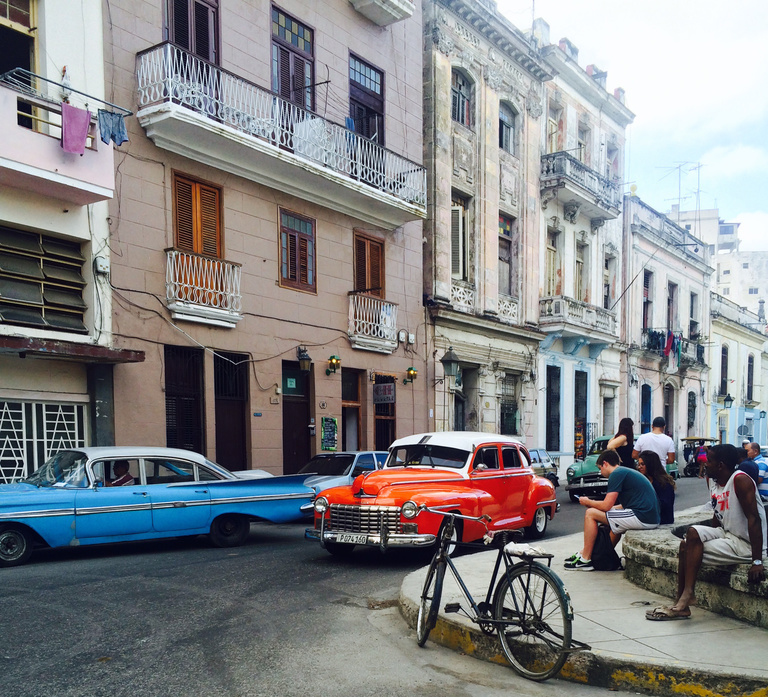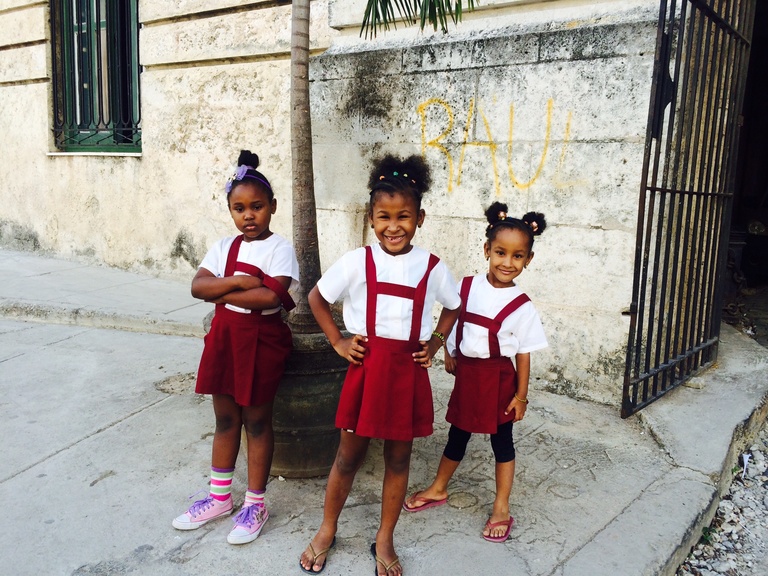UI Study Abroad Diversity Ambassador Scholar Mikkia Graves is a senior majoring in mathematics with a minor in statistics and a certificate in entrepreneurial management. This winter, Graves studied abroad on the USAC Havana Program in Havana, Cuba, where she explored the history and culture of Cuba. In this letter, she reflects on her study abroad experiences in Cuba and India as both a first-generation college student and an African American woman.

Mikkia Graves is a senior at the University of Iowa majoring in mathematics with a minor in statistics and a certificate in entrepreneurial management.
Dear Prospective Student,
My name is Mikkia Graves and I am a graduating senior studying Mathematics with a minor in Statistics and a certificate in Entrepreneurial Management. I think that the most beneficial advice I can give someone interested in studying abroad is to just GO FOR IT! No matter what reservations you have about studying abroad whether they be financial or even finding a program that fits you, there are solutions out there. There are a number of grant and scholarship opportunities at the UI that made both of my study abroad trips financially feasible for me. These trips are amazing opportunities for you to be introduced to new cultures, and if you allow yourself to really live in the moment, they can be truly life-changing experiences.
As a first-generation college student from the south side of Chicago, I entered my freshman year with little to no information about how to navigate the huge giant called, “College.” When the time was right, I embarked on my first study abroad trip for research in India under the Resilient and Sustainable Agricultural Watersheds program. The most rewarding part of my trip was knowing that the research I conducted with my team would be used to aid in the development of alternative water resources for a very special village in Mewat, India.
I also left with a very special kind of experience that I never would have imagined going to India. While speaking with graduate students in the engineering program at the University of Rookee during a college visit, we addressed the topic of cultural identity. Some of the students who were originally from Ghana, Ethiopia, Tanzania, and Nigeria, all had tons of questions about where I was from and my family’s history.
I told them that I was born and raised in America, and so were my parents and their parents as well. This was baffling to them. Before my grandparents, I have no record of where my family is from. I knew that the other students were waiting for me to tell them which county in Africa my family comes from, but I simply wasn't able to. It was hard for them to accept that I didn’t know my family’s heritage because they all take such pride in their own national identities. Before I left, one of the students from Ethiopia told me not to worry because my name is common in his country. This still stands out as one of my most memorable moments in India because he saw that I was a little ashamed about not knowing a huge part of my family’s, and my own, heritage and wanted to share a fact with me that might cheer me up and I was so grateful to him for that comment. It gave me a sense of belonging. Cultural identity is a topic that I’ve always struggled with, but I found comfort in our discussion because it awakened my curiosity to learn more about African culture and to seek the origins of my own family history.

A view of the streets of Havana.
One year later, I decided to study abroad again. This time the destination was Cuba. Unsure of what to expect, I welcomed the opportunity with open arms. Initially I was concerned about my current level of Spanish would pose an insurmountable language barrier and I was aware that the current relations between the U.S and Cuba could potentially have an impact on my experience. As an American, I wasn’t quite sure how I would be received by Cubans.
On January 26th, 2015, I joined 24 other students from across the country on a trip to La Habana, Cuba on a program sponsored by the University Studies Abroad Consortium (USAC).
After my first full day in Cuba, it was clear that this would be a trip to remember. I vividly remember walking down the calle de Obispo, the major tourist street in La Habana, and being completely captivated by all the beautiful Cubans. There were so many beautiful black faces. I was in a place surrounded by people that looked just like me. I had no idea that the Afro-Cuban presence would be so strong, and vividly represented everywhere I went. It was absolutely amazing. This was very different from my experience in India where I was constantly inspected by the many curious faces that had never seen a black woman, let alone a 6-foot tall woman, before.
In Cuba, I blended in, I looked just like the Cubans, and it was only once I began to speak and they heard my struggling accent that my foreign identity was revealed. Once I explained that I was American, the Cubans immediately became overjoyed and curious to know how I could possibly be in Cuba. It was so rare for Cubans to meet Americans for so many year that they had tons of questions.
Living in an apartment and walking to class every day amongst other Cubans really allowed me to dive directly into the culture. I wanted to walk, talk, eat, live and breathe just as the Cubans, so that’s exactly what I did. I made sure that each day I tried something new, so that I could make the best of each and every single day. Some of my trips included visiting Matanzas, famous for its rich Afro-Cuban culture and well known poets, Varadero beach which is said to be the most beautiful beach in the world, and the Bay of Pigs which is the location of the a failed invasion of Cuba by the US military in 1961.

"The entire time I was (in Cuba) I felt a strong sense of brotherhood and community."
There was a nostalgic beauty about Cuba, not just in the buildings and landscape, but in the people as well. The entire time I was there I felt a strong sense of brotherhood and community. I felt wanted and accepted. And even in the absence of internet and cell phone usage, I experienced the beauty in creating meaningful relationships with new friends through face-to-face interactions. It felt authentic- like the way things should be.
This trip gave me the encouragement I needed to keep pressing forward in my academic career. At times it's been difficult being a minority at a predominantly white institution where every day I’m the only black student in a classroom. And because of the major I’ve chosen, there have been times when I am also the only female. Being exposed to the Afro-Cuban culture and learning that many of the struggles blacks face in America are not unique but are shared with my brothers and sisters in Cuba was life-changing. It opened up my eyes to the reality that Afro-Cubans and African-Americans are all direct descendants of the African diaspora. This realization was very special to me because I felt a new connection and sense of pride in my African roots. Although I still have no information on my direct lineage, I felt this new experience of African-influenced culture as a whole helped to fill a void inside of me.
There’s something beautiful that happens when studying abroad, when you free your mind and completely allow yourself to be immersed into another culture, and then watch what happens.
I’ve felt it, and I hope you will too.
Sincerely,
Mikkia Graves
Learn more about the Diversity Ambassador Scholarship for Study Abroad
Read more about the 2014-15 Cuba winterim trip in this article by program leader and UI professor Adriana Mendez.